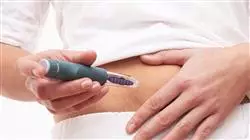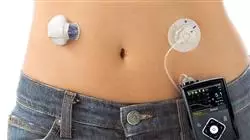University certificate
The world's largest faculty of medicine”
Introduction to the Program
This program is the best option you can find to specialize in Diabetes"

Diabetes is a complex, chronic process that requires specific knowledge and skills for a comprehensive approach that goes beyond glycemic control.
This Professional master’s degree in Diabetes presents a global and complete vision of the disease that is useful for adequately managing patients with diabetes at any level of care.
This is a unique and innovative academic program, based on an up-to-date description of the epidemiological situation of diabetes. This program provides an in-depth study of the complex pathophysiology of the disease, the integral evaluation of acute and chronic complications, from a specialized point of view, and its comprehensive treatment.
Its contents cover the most innovative aspects of diabetes, such as the implementation of technology to control and treat this disease, and the most innovative areas in the research of new therapeutic approaches.
All this, without forgetting the crucial role of diabetes education for the control of the disease.
This program is unique as it includes a broad view of the disease across all patient ages and special situations. It also delves into the social aspects of diabetic patients' lives that require specific knowledge so that they can be addressed.
A quality program with which you will be able to stand out in a highly competitive sector and improve your skills and Knowledge of the field.
Improve the quality of care for your patients with this innovative diabetes program"
This Professional master’s degree in Diabetes contains the most complete and up-to-date scientific program on the market. The most important features include:
- Practical cases presented by experts in Diabetes
- The graphic, schematic, and practical contents with which they are created, provide scientific and practical information on the disciplines that are essential for professional practice.
- New developments in Diabetes
- Practical exercises where the self-assessment process can be carried out to improve learning
- Special emphasis on innovative methodologies in Diabetes
- Theoretical lessons, questions to the expert, debate forums on controversial topics, and individual reflection assignments
- Content that is accessible from any fixed or portable device with an internet connection
This Professional master’s degree may be the best investment you can make in the selection of a refresher programme for two reasons: in addition to updating your knowledge of Diabetes, you will obtain a degree from TECH Global University"
The teaching staff includes professionals from the field of Diabetes, who bring their experience to this specialization program, as well as renowned specialists from leading societies and prestigious universities.
The multimedia content, developed with the latest educational technology, will provide the professional with situated and contextual learning, i.e., a simulated environment that will provide immersive training programmed to train in real situations.
The design of this Program focuses on Problem-Based Learning, by means of which the professional will have to try to solve the different situations of Professional Practice, which will be posed throughout the Program. For this purpose, the professional will be assisted by an innovative interactive video system created by renowned and experienced experts in Diabetes with extensive medical experience.
Take the step and join our team. You will find the best educational material to enhance your studies"

This 100% online Professional master’s degree will allow you to combine your studies with your professional work while increasing your knowledge in this field"
Why study at TECH?
TECH is the world’s largest online university. With an impressive catalog of more than 14,000 university programs available in 11 languages, it is positioned as a leader in employability, with a 99% job placement rate. In addition, it relies on an enormous faculty of more than 6,000 professors of the highest international renown.

Study at the world's largest online university and guarantee your professional success. The future starts at TECH”
The world’s best online university according to FORBES
The prestigious Forbes magazine, specialized in business and finance, has highlighted TECH as “the world's best online university” This is what they have recently stated in an article in their digital edition in which they echo the success story of this institution, “thanks to the academic offer it provides, the selection of its teaching staff, and an innovative learning method aimed at educating the professionals of the future”
A revolutionary study method, a cutting-edge faculty and a practical focus: the key to TECH's success.
The most complete study plans on the university scene
TECH offers the most complete study plans on the university scene, with syllabuses that cover fundamental concepts and, at the same time, the main scientific advances in their specific scientific areas. In addition, these programs are continuously being updated to guarantee students the academic vanguard and the most in-demand professional skills. In this way, the university's qualifications provide its graduates with a significant advantage to propel their careers to success.
TECH offers the most comprehensive and intensive study plans on the current university scene.
A world-class teaching staff
TECH's teaching staff is made up of more than 6,000 professors with the highest international recognition. Professors, researchers and top executives of multinational companies, including Isaiah Covington, performance coach of the Boston Celtics; Magda Romanska, principal investigator at Harvard MetaLAB; Ignacio Wistumba, chairman of the department of translational molecular pathology at MD Anderson Cancer Center; and D.W. Pine, creative director of TIME magazine, among others.
Internationally renowned experts, specialized in different branches of Health, Technology, Communication and Business, form part of the TECH faculty.
A unique learning method
TECH is the first university to use Relearning in all its programs. It is the best online learning methodology, accredited with international teaching quality certifications, provided by prestigious educational agencies. In addition, this disruptive educational model is complemented with the “Case Method”, thereby setting up a unique online teaching strategy. Innovative teaching resources are also implemented, including detailed videos, infographics and interactive summaries.
TECH combines Relearning and the Case Method in all its university programs to guarantee excellent theoretical and practical learning, studying whenever and wherever you want.
The world's largest online university
TECH is the world’s largest online university. We are the largest educational institution, with the best and widest online educational catalog, one hundred percent online and covering the vast majority of areas of knowledge. We offer a large selection of our own degrees and accredited online undergraduate and postgraduate degrees. In total, more than 14,000 university degrees, in eleven different languages, make us the largest educational largest in the world.
TECH has the world's most extensive catalog of academic and official programs, available in more than 11 languages.
Google Premier Partner
The American technology giant has awarded TECH the Google Google Premier Partner badge. This award, which is only available to 3% of the world's companies, highlights the efficient, flexible and tailored experience that this university provides to students. The recognition as a Google Premier Partner not only accredits the maximum rigor, performance and investment in TECH's digital infrastructures, but also places this university as one of the world's leading technology companies.
Google has positioned TECH in the top 3% of the world's most important technology companies by awarding it its Google Premier Partner badge.
The official online university of the NBA
TECH is the official online university of the NBA. Thanks to our agreement with the biggest league in basketball, we offer our students exclusive university programs, as well as a wide variety of educational resources focused on the business of the league and other areas of the sports industry. Each program is made up of a uniquely designed syllabus and features exceptional guest hosts: professionals with a distinguished sports background who will offer their expertise on the most relevant topics.
TECH has been selected by the NBA, the world's top basketball league, as its official online university.
The top-rated university by its students
Students have positioned TECH as the world's top-rated university on the main review websites, with a highest rating of 4.9 out of 5, obtained from more than 1,000 reviews. These results consolidate TECH as the benchmark university institution at an international level, reflecting the excellence and positive impact of its educational model.” reflecting the excellence and positive impact of its educational model.”
TECH is the world’s top-rated university by its students.
Leaders in employability
TECH has managed to become the leading university in employability. 99% of its students obtain jobs in the academic field they have studied, within one year of completing any of the university's programs. A similar number achieve immediate career enhancement. All this thanks to a study methodology that bases its effectiveness on the acquisition of practical skills, which are absolutely necessary for professional development.
99% of TECH graduates find a job within a year of completing their studies.
Professional Master’s Degree in Diabetes
Professional Master’s Degree in Diabetes
Diabetes is a global problem, according to the World Health Organization (WHO), the number of people with this pathology increased from 108 million in 1980 to 422 million in 2014. The prevalence of this disease forces specialized centers to acquire the services of updated professionals who can provide new therapeutic alternatives to this complex situation. At TECH Global University we understand perfectly the needs of the labor market, which is why we have designed the Master's Degree in Diabetes as an excellent opportunity for academic preparation. In this program of 1,500 instructive hours, students will have access to an innovative curriculum that will allow them to know in depth the different states of alteration of glucose metabolism, its classification and diagnostic criteria. They will also acquire the necessary skills to carry out a global treatment, based on nutritional measures, exercise and healthy habits of the patient.
Study a postgraduate course in diabetes 100% online
At TECH we have a highly experienced faculty in diabetic pathology, thanks to this, students will learn from medical experts the following topics: epidemiology, evaluation of comorbidities, microvascular complications and management of the disease, among other topics of great academic value. Likewise, the professional will be instructed to establish efficient professional links that will allow the patient to have total confidence in the therapeutic process, thus improving his or her quality of life. Upon successful completion of the program, our students will obtain a university degree of high prestige.







